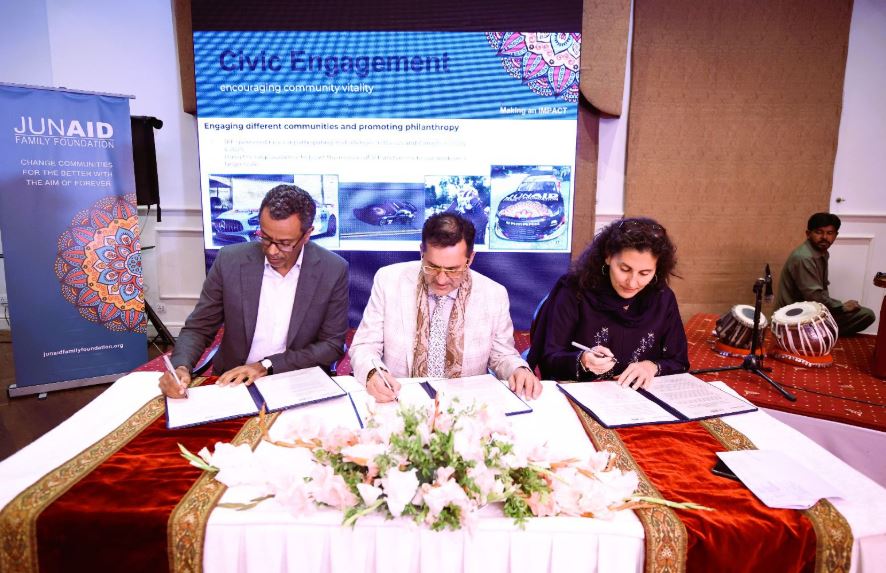In a significant step towards advancing maternal and newborn health in Pakistan, the Junaid Family Foundation (JFF) has entered into a groundbreaking Letter of Cooperation (LoC) with the Bill & Melinda Gates Foundation and UNICEF. The agreement focuses on the scale-up and promotion of Multiple Micronutrient Supplementation (MMS) for pregnant women, aiming to address critical nutritional deficiencies that affect maternal and fetal health.
Pakistan is already recognized as a leader in MMS expansion, but this formal agreement underscores a renewed commitment to ensuring that all pregnant women across the country can access these vital supplements. Key areas of focus include bolstering supply chains, expanding national awareness campaigns, and supporting scientific research and implementation strategies to improve the reach and efficacy of MMS programs.
Targeting Systemic Gaps and Local Solutions
An estimated 7 million Pakistani women become pregnant each year, yet access to adequate prenatal nutrition remains a challenge. Through previous joint efforts, nearly 2 million women have already benefited from UNIMMAP MMS—donated by JFF in collaboration with Kirk Humanitarian. However, the gap remains substantial, especially in underserved regions where maternal malnutrition is most acute.
Ansir Junaid, Chairman of JFF, emphasized the importance of strategic partnerships in bridging this divide. “Working alongside global organizations like the Gates Foundation and UNICEF allows us to align international best practices with the local context,” he said, highlighting JFF’s role in hosting major conferences to galvanize national support for maternal health initiatives.
Strengthening Policy and Expanding Access
The collaboration goes beyond distribution; it aims to embed MMS in Pakistan’s national healthcare policies. This includes advising federal and provincial authorities on evidence-based decision-making, organizing strategic working group meetings, and supporting policy reforms that prioritize MMS in antenatal care guidelines.
Efforts will also target local production and market availability, ensuring that MMS becomes not just accessible but affordable and sustainably sourced. By working with the private sector, the initiative seeks to build long-term capacity for producing high-quality supplements within Pakistan.
A Long-Term Vision for Health Equity
Maternal undernutrition remains a persistent challenge in Pakistan, contributing to complications such as low birth weight, stillbirths, and anemia. MMS is globally endorsed for its effectiveness in mitigating these risks, and this collaboration marks a strategic shift towards replacing traditional iron-folic acid supplementation with a more comprehensive approach.
Speaking on the broader impact, Jackie Range, Executive Director of JFF, remarked, “This is not about charity—it’s about rights and investment. Proper nutrition is foundational to economic growth, healthier communities, and intergenerational progress.” Her comments reflect the shared philosophy of the partnership: that maternal nutrition must be seen as a cornerstone of sustainable development.
Read More: IHC Maintains Injunction on Greentree’s Acquisition of TRG Pakistan
A Commitment Sealed in Islamabad
The Letter of Cooperation was formally signed at a dinner hosted by JFF in Islamabad. Ansir Junaid was joined by Zeina Sifri of the Gates Foundation and Abdullah Fadil of UNICEF to cement their collective commitment to this cause. The event symbolized not only a partnership among institutions but a pledge to Pakistan’s women and future generations.
Each organization brings its own strengths to the table. The Gates Foundation offers global expertise in data-driven solutions and innovation in health equity. UNICEF contributes decades of experience in child and maternal health. Meanwhile, JFF combines grassroots engagement in Pakistan with its international reach, operating both in Cleveland, Ohio, and across Pakistan’s health and development sectors. Currently, JFF supports the largest MMS initiative in the country.
This partnership signals a turning point in maternal health advocacy and implementation in Pakistan—a step towards a future where no woman is deprived of the nutrition she needs for a healthy pregnancy, and every child is given the strongest possible start in life.
This article was received directly from the reporter.













